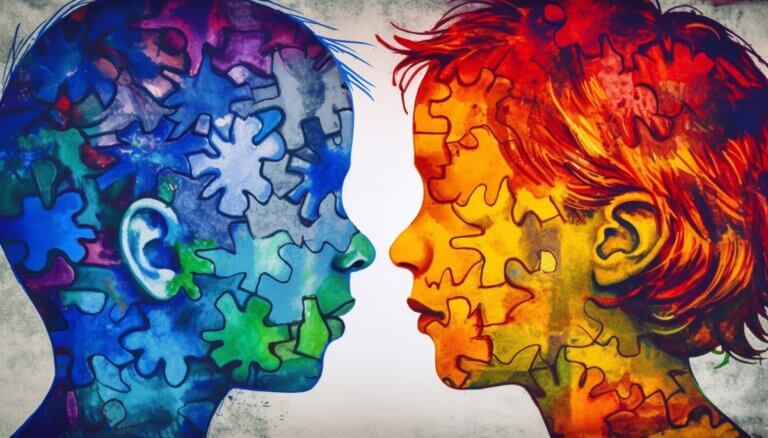Table of Contents
The Pillars of Emotional Intelligence

Self-perception and Self-reflection
The ability to recognize and understand one’s own emotions is the foundation of Emotional Intelligence. This understanding is essential for navigating the complex labyrinth of human relationships and promoting personal and professional growth. By learning to understand and interpret our emotions, we can make better decisions and deal with stress more effectively.
The Role of Self-Awareness in Emotional Intelligence
Self-awareness is the first step on the journey to increased Emotional Intelligence. It involves the ability to identify and name one’s own emotions at the moment they occur. This is not always easy, as feelings often arise automatically in response to external stimuli. A practical example of this is the work situation: Suppose you suddenly feel uncomfortable during a team discussion. With pronounced self-awareness, you might identify that this is not actually an aversion to your colleagues, but perhaps fear of presenting your own ideas.
- Emotion awareness allows for better understanding of one’s own decisions
- It is key to improving interpersonal relationships
- Enables more authentic and empathetic actions
The Power of Self-Reflection
Self-reflection is a deepening process where we not only recognize our emotions but also understand the underlying causes and effects on our behavior. This deeper understanding allows us to analyze our behavioral patterns and understand what prompts us to certain reactions. Take, for example, a common scenario: the reaction to criticism. A person without pronounced Emotional Intelligence might defend themselves or withdraw. With self-reflection, however, the same person can recognize that the defensive posture often stems from a lack of self-confidence or fear of making mistakes.
- Promotes personal growth through understanding and improving emotional responses
- Improves our responsiveness by developing mechanisms for healthy stress management
- Supports the formation of deeper and more understanding relationships
Influence of Emotional Intelligence on Everyday Life
The fundamentals of Emotional Intelligence have a far-reaching significance, as they affect almost all aspects of our daily lives. With a solid understanding of Emotional Intelligence, we can more skillfully resolve conflicts, improve our relationships, and generally lead a more fulfilling life. In practice, this means that a person with high Emotional Intelligence can step back in a heated discussion, reflect on their own feelings, and thus avoid an escalating confrontation.
- Increases effectiveness in communication and conflict resolution
- Promotes leadership skills and teamwork abilities
- Helps in managing challenges and achieving personal goals
By implementing Emotional Intelligence introduction into practice, the path to greater self-knowledge is paved, thus laying the foundation for a richer, more understanding life.
Self-regulation and Emotion Management
Emotional intelligence is a concept that plays a significant role in our society today. An introductory look into the foundations of Emotional Intelligence shows that the ability to recognize and manage one’s own and others’ emotions not only improves personal well-being, but is also fundamental for successful interpersonal relationships.
Techniques for Managing Negative Emotions
Negative emotions are part of human life and influence our thinking and actions. But how can we manage them? The practice of mindfulness, where a person focuses their attention on the present moment and views their feelings without judgement, is a proven method. Cognitive restructuring, which makes it possible to identify and change negative thought patterns, also plays a crucial role. Another effective tool is self-reflection, which helps to understand the causes of one’s emotions and to develop adapted responses.
- Through mindfulness: Becoming aware of and accepting emotions without immediate reaction.
- By means of cognitive restructuring: Reinterpreting negative thoughts into constructive perspectives.
- With self-reflection: Identifying the emotional triggers and their impact on behavior.
Development of Impulse Control
Impulse control is a critical component of Emotional Intelligence. The ability to delay short-term temptations in favor of long-term goals is not only important for personal goal pursuit, but also in social interactions. Strategies include setting clear goals, implementing if-then plans, and consciously approaching potentially impulsive situations.
- Goal setting: Having a clear goal in mind to resist distractions.
- If-Then plans: Establishing specific measures for foreseeable situations.
- Conscious approach: Developing strategies in advance to avoid impulsive actions.
Promoting Positive Emotional States
Promoting positive emotions is another key aspect of Emotional Intelligence. They not only strengthen individual well-being but also positively influence interpersonal relationships. Gratitude exercises, keeping a positivity journal, and consciously perceiving and enjoying pleasant experiences are approaches that help intensify positive feelings in everyday life.
- Gratitude exercises: Daily pausing and expressing thanks for positive events promotes well-being.
- Keeping a positivity journal: Documenting joyful moments supports positive reflection.
- Consciously enjoying: Directing attention to pleasant experiences enhances positive emotions.
The impact of these approaches on social interaction is considerable. By learning to effectively manage our emotions, we enrich not only our own lives but also contribute to more harmonious and healthier relationships. The significance of Emotional Intelligence therefore extends far beyond individual aspects and is an integral part of a connected, empathetic society.
Application of Emotional Intelligence in Social Contexts

Empathy and Social Skills
Empathy is a cornerstone of Emotional Intelligence and paves the way for effective interpersonal relationships both in private life and in professional daily routines. It enables us to understand the feelings of others and respond appropriately. This profound ability forms the foundation for social skills and is indispensable for successful interaction in all areas of life.
The Importance of Empathy in Professional Life
The fundamentals of Emotional Intelligence postulate that empathy is not a luxury, but a necessity for anyone who wants to be successful in team-oriented and customer-focused work environments. Studies consistently show that empathetic leaders not only increase job satisfaction and loyalty among their employees but also enhance their productivity.
- A manager who can put themselves in the position of their team members is more likely to provide support and motivation rather than triggering pressure and dissatisfaction.
- In customer service, empathy allows for an understanding of clients’ needs and concerns, leading to better customer satisfaction and stronger client relationships.
- In negotiations, an empathetic understanding helps create win-win situations, since the interests of all parties can be appropriately considered.
Empathy in Personal Relationships
Empathy is just as crucial in personal relationships. It ensures a deeper emotional connection and is the basis on which mutual understanding and respect can thrive.
- For example, when a friend expresses disappointment over a failed exam, the empathetic response of the listener allows for offering comfort and support.
- In family conflicts, empathetic listening can make the involved family members feel understood and valued, paving the way for a resolution.
- Partnerships benefit from empathy through a deep emotional bond and the ability to resolve conflicts constructively and satisfactorily for both sides.
Empathy as a bridge to trust is evident in all forms of human interaction. Where empathy is practiced, spaces are created where people are willing to open up and share. This is indispensable for building trust and ultimately creating cooperative and supportive environments in both professional and private life.
The compelling examples from everyday life demonstrate that understanding and applying empathy are central to the development of social skills and significantly influence the quality of our relationships. Emotional Intelligence thereby gains a practical dimension by helping us not only to understand ourselves better but especially those around us daily.
Relationship Management and Communication
Emotional intelligence is a multifaceted ability that plays a key role in relationship management and communication. The ability to recognize, understand, and appropriately respond to one’s own and others’ emotions can mean the difference between a successful and a failing interaction.
Methods for Conflict Resolution
A prominent feature of individuals with high emotional intelligence is their competence in conflict resolution. They can identify emotional undercurrents in a conversation and use this knowledge to clear up misunderstandings. For example, a leader with high emotional competence recognizes when an employee is losing motivation due to unarticulated frustrations within the team. Through active listening, empathy, and targeted questions, the leader can grasp the core of the problem and develop a solution together with the employee.
- Relaxed body language and the use of open, supportive gestures contribute to creating a trusting atmosphere.
- Formulating ‘I’ messages helps to express one’s own perspective without attacking the other party.
- Avoiding blame and focusing on solutions promote constructive dialogue.
Promotion of Teamwork
A solid foundation in emotional intelligence is crucial for effective teamwork. By perceiving and respecting the emotions of their colleagues, team members create an environment of support and creativity. For example, a team member aware that a colleague is burdened by personal challenges might offer additional help or show consideration during stressful phases. Such acts of consideration can enhance the overall morale of the team and thus lead to increased productivity.
Emotional Intelligence in Effective Leadership
Understanding emotional intelligence is also an indispensable part of effective leadership. Good leaders use their knowledge of the significance of emotional intelligence to create an environment that motivates employees and enables them to perform their best. They do this by conveying a vision that appeals not only intellectually but also emotionally. Consider a manager who recognizes the uniqueness of each team member and creates individual development plans. Such a personalized approach shows respect for each individual’s personal development and enhances employee retention and performance. By picking up on and responding to emotional signals, the leader strengthens loyalty and engagement within their team.
In summary, it is evident that understanding and applying the principles of emotional intelligence, whether in professional life or personal affairs, is a central component for efficient relationship management and persuasive communication. By integrating this knowledge, conflicts can be resolved more constructively, team dynamics improved, and leadership effectiveness enhanced.
Summary
Emotional intelligence is a key skill that plays a crucial role in personal and professional growth. It serves as a compass for navigating the complex web of human relationships. The Introduction to Emotional Intelligence begins with self-awareness, our ability to recognize and name feelings at the moment they occur. This awareness is fundamental for acting authentically and empathetically and making informed decisions.
- Emotional awareness creates a solid Emotional Intelligence Foundation for wise decision-making and stress management.
- Understanding one’s own emotions leads to more mature interpersonal relationships.
- Self-reflection helps identify underlying causes of behavioral patterns.
Practical Application in Everyday Life and Profession
The fundamentals of Emotional Intelligence enable us to resolve conflicts and make our communication more efficient. High Emotional Intelligence can help in heated discussions to take a step back and reduce escalation through reflected responses. Also, emotional competence contributes to the promotion of teamwork and effective leadership. Methods such as active listening and empathetic understanding significantly improve social interactions and can be implemented in the following ways:
- Mindfulness and cognitive restructuring support the management of negative emotions.
- Promotion of positive feelings through gratitude exercises and positive journals.
- Development of impulse control through goal setting and planning for self-regulated action.
Empathy, as the core of Emotional Intelligence Significance, is indispensable not only privately but also professionally. It enables managers to understand the needs of their employees and supports customer service in addressing customer concerns.
The skills developed in the area of Emotional Intelligence demonstrate their value also in conflict resolution. People with high emotional intelligence rely on communication that clarifies misunderstandings and promotes constructive solutions.
A profound Understanding of Emotional Intelligence is thus reflected in all areas of life. Applying this knowledge enriches daily life and contributes to building an empathetic society. Empathy allows for the creation of effective relationship building and is essential for success in team and leadership contexts.
Overall, the Introduction to Emotional Intelligence is the first step towards greater self-knowledge and a more fulfilled life both personally and professionally. Emotional competencies such as self-awareness, self-regulation, and empathy are the pillars that create a solid foundation for interpersonal and intrapersonal relationships.
FAQ – Introduction to Emotional Intelligence
How can emotional intelligence specifically contribute to better teamwork and leadership skills in the workplace?
Emotional intelligence enables leaders to recognize the emotions of their team members and to respond empathetically, thereby creating a supportive work climate that leads to increased motivation and collaboration. Within teams, it promotes conflict resolution skills by helping to understand the perspectives of others, thus contributing to a harmonious and effective work environment.
Why is emotional intelligence important in the workplace?
Emotional intelligence is essential in the workplace as it strengthens the capacity for empathy and effective communication, leading to a harmonious interaction and improved teamwork. It enables constructive conflict resolution and promotes a work atmosphere where employees feel understood and valued, which in turn can boost motivation and productivity. Practically, an emotionally intelligent leader can, for example, recognize and respond to the mood of their team to create a motivating work environment, while employees with high emotional intelligence can respond more empathetically to customer needs, enhancing customer satisfaction.
How can emotional intelligence contribute to the improvement of teamwork and leadership skills in a professional environment?
Emotional intelligence enables leaders and team members to perceive the emotions of others and respond appropriately, leading to a better understanding and more effective communication. This promotes a work environment of respect and recognition, which improves teamwork and reduces conflicts. Additionally, skills in self-regulation and empathy aid in the development of leaders who can inspire and motivate employees to work together towards common goals.




